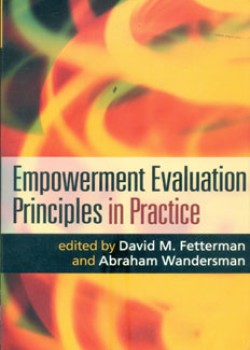
Empowerment Evaluation Principles in Practice
Editor: Fetterman, David M. and Wandersman, A..
Publisher: Guilford Publishers
Place of Publish: USA, New York
Year: 2005
Page Numbers: 231
Acc. No: 3669
Class No: 374 EMP-ME
Category: Books & Reports
Subjects: Monitoring and Evaluation
Type of Resource: Monograph
Languages: English
ISBN: 1-59385-114-6
Empowerment evaluation is a seminal, critical and welcome evaluation approach, particularly for all who lament the failure of the evaluation process to shape and frame an approach that is as useful to practitioners working on the ground as it is to policymakers and others making decision at the highest levels. What principles should guide an empowerment evaluation? And how can these principles be put into practice? One of the primary tasks in an empowerment evaluation (EE) is to increase the capacity of programme stakeholders to plan, implement, and evaluate their own programmes. This book presents the most current formulation of the 10 principles of EE and provides professionals and students with the tools to put these principles into practice. Through case studies of diverse evaluation projects--including community health foundation initiatives, school district programmes, and a $15 million corporate programme aimed at bridging the digital divide--the founder and leading proponents of EE clarify key concepts and discuss important lessons learned. Coverage includes how to balance programme improvement efforts with accountability requirements, how EE can be used to guide standards-based work, how to use EE in a learning organization, the differences among empowerment, collaborative, and participatory evaluation, and much more.



